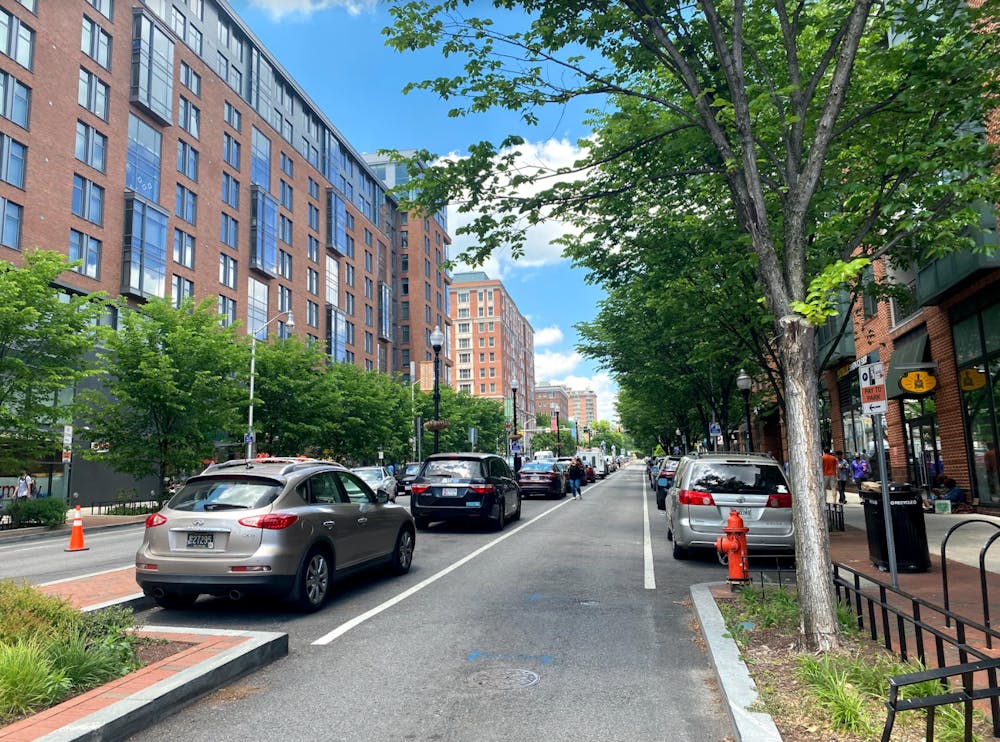Students, professors and faculty across the city rely on the The Johns Hopkins Medical Institute (JHMI) Shuttle, the bus route that connects Homewood, Peabody and the med campus. Recently, frequent delays and unreliability of the JHMI have caused riders inconvenience.
Second-year master’s student Venus Chiu noted that she has been taking the JHMI two to three times a week since she first moved to Baltimore in August.
“I’ve had issues with the buses for a while. I submitted a report about the arrival times not accurately showing up on the app,” she said. “On the bright side, you bond with other riders at the bus stop who are waiting with you.”
Greg Smith, director of Transportation Services, explained that the University had been undergoing a proposal process over the last year to find a new bus provider service. The University negotiated with the new service, Academy Bus Lines, to officially begin on Oct. 2. However, the agreement with Broadway Services, the previous service contractor, was set to expire on June 30.
According to Smith, the contract with Academy will officially begin starting Oct. 2, with a fleet of 13 buses expected to return with an expanded capacity. The University is also hoping to transition to electric buses, with the goal of half of the fleet being electric by 2024 and an anticipated full conversion to electric by 2026.
Since June 30, Smith noted, the University had continued on a month-by-month contract with Broadway Services. On Sept. 13, however, Broadway informed the University that it was no longer able to meet its scheduled requirements because of employee loss and a lack of safe buses.
On Sept. 15, the University announced that the Homewood-Peabody-JHMI route would be modified to eliminate service interruptions. The frequency of rides was to decrease, lengthening the time between rides when buses had been previously available.
Under the modified schedule, buses are scheduled to arrive every 10 to 30 minutes on the weekday route. Before the modification, a bus was supposed to arrive every six to 30 minutes on weekdays. In interviews with The News-Letter, many stated that this wasn’t the case.
Junior Andre Vu rode the bus two to three times a day over the entirety of the summer and said that he had been on multiple buses that had problems, including late arrivals.
“The JHMI broke down on a ride I was on once, and it would stop in the middle of the street [due to malfunctioning] at times,” he said.
The University had promised that it would bring in additional buses to help alleviate the gap during the period of transition between providers. However, many students reported that they have not noticed a difference.
Chiu noted that the unreliability of the JHMI caused her to miss an event; however, she has been able to work her schedule around the JHMI’s delays and does not feel that they have affected her too much.
“I had one instance a couple weeks ago — I missed a live talk that I was planning to do at the Homewood Campus because the JHMI didn’t come when it said it was going to,” Chiu said. “Luckily, the event was recorded.”
Senior Tere’ssa Fleming had similar experiences to Vu. Fleming took the JHMI two to three times a day and five days a week this past summer.
“I’ve ended up showing up late to work a couple of times because of it, but luckily my employer was understanding,” she said.
The University has attributed these service interruptions to the age of the current buses and staffing issues with the current provider. These service interruptions are scheduled to continue until Oct. 1.
Rob Shearman, manager of transportation at the University, elaborated on how the pandemic resulted in staffing shortages.
“Staffing was already tenuous because of COVID-related concerns, but the transition from one provider to another exacerbated an already tenuous situation,” he said.
Vu noticed specific changes with the drivers when COVID-19 policies shifted.
“When the buses no longer had a person limit for COVID, I noticed the inconsistencies more,” he said. “Multiple bus drivers would drive past the JHMI stops every single day over the summer. The morning times were better, and at the Homewood Campus the arrivals were more on time, but the issues rose when I was trying to get back home from the med campus.”
Vu emphasized the importance of drivers feeling safe on their routes.
“When there is driver dissatisfaction, it results in overall dissatisfaction for all of the Hopkins community,” he said. “When the bus drivers feel that they aren’t being treated the way they are supposed to be treated, then the whole system crumbles. It’s not their fault.”
Shearman reflected on how the approval process for the new contract resulted in the interruptions.
“We had hoped to make this transition from one service operator to another before the fall semester, but the approval process made it a little more lengthy than we had hoped,” he said. “It's a 10-year contract, multi-millions of dollars, and the approval process made it all the way up the chain up to include President Ron Daniels.”
Smith emphasized the changes that will be coming to the JHMI operations will improve the shuttle’s reliability and the conditions of the buses.
“It’s a new fleet of buses for JHU, with a new design wrapped on the buses. We put in a new schedule, including doubling the weekend trips and returning the weekday trips to full service,” he said.
CORRECTION: The previous version of the article incorrectly implied that Chiu’s schedule was greatly impacted by the JHMI’s delays. The News-Letter regrets this error.





